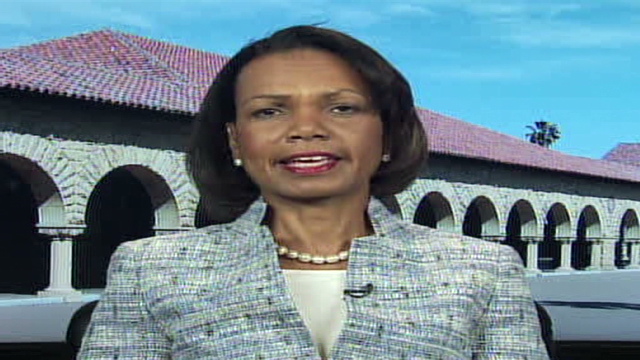Condoleezza Rice on bin Laden’s Death
Former U.S Secretary of State Condoleezza Rice tells Zain Verjee about her surprise at the whereabouts of Osama Bin Laden when he was killed. FULL TRANSRIPT BELOW **Any use of this material must credit CNN
ZAIN VERJEE, CNN INTERNATIONAL ANCHOR: Thank you so much for being with us.
What was your personal reaction when you learned that Osama bin Laden was killed?
CONDOLEEZZA RICE, FMR. SECRETARY OF STATE: Well, it was very gratifying because for our country this brings an important chapter to a close and it shows that the United States can, with patience and persistence, do something like this. As President Bush said back on September 20th before the Congress in 2011 — 2001, when he said we will not tire, we will not falter, we will not fail, he meant the United States of American and it shows we can be persistent.
VERJEE: Why do you think he chose to be so close to Islamabad and in the military’s backyard?
RICE: Well, I was surprised. I thought, like most people, that he was probably hiding someplace in the northwest frontier between Pakistan and Afghanistan. I don’t know why he chose to move where he did. But I think, for the Pakistani, it raises some very difficult questions, questions that they want to know the answers to because, after all, they’ve suffered a great deal at the hands of terrorists, as well, and I’m certain that it’s caused some internal look at how they’re operating in Pakistan.
VERJEE: Do you think photographs of his death should be released as proof to the public?
RICE: Well that’s something the administration will have to decide. They’ll have to weigh all of the factors there. I don’t think that there is really any doubt that he is dead. The DNA match — I’m certain that they made certain. So it isn’t an issue of a need for confirmation. But if the administration believes that that would help worldwide, then they should do it.
VERJEE: Why couldn’t the Bush administration capture or kill Osama bin Laden after a nearly eight-year hunt?
RICE: These things take time and the policies that the — President Bush put in place, including the rounding up like people like Khalid Sheikh Mohammed and al-Libi and others, the cooperation that our intelligence forces and our military were able to show extraordinary integration. These are all policies that have been in place now for a number of years. But Osama bin Laden was determined not to be found.
I remember when we learned of the courier and that there might be a link to him through this courier. It then took painstaking efforts to put together all the pieces, to further identify them, to find a time when you could do this, to plan the operation. But this shows that across presidencies, the United States is able to use its long reach to take down those who would harm us.
VERJEE: There are so many questions today about whether or not the U.S. can trust Pakistan in fighting terrorism. If you could speak to President Zardari today, what would you say?
RICE: Well, Pakistan is an important partner in counterterrorism corporation and we’ve had very important cooperation from them. We caught Khalid Sheikh Mohammed, for instance, in Pakistan, and they were helpful. But, as I said, this is not just what the United States needs to know, it’s what Pakistan needs to know. And President Zardari and his team need to understand better how Osama bin Laden could hide in plain sight in that kind of compound without the knowledge of high-ranking officials. It’s an important question for Pakistan.
VERJEE: It’s a huge embarrassment, too, though, isn’t it?
RICE: Well, it’s not a good thing for Pakistan. It’s not a good thing for us. But I’m a veteran of government service. I know that very unusual things can happen so I don’t want to jump to any conclusions about what might have happened in Pakistan. That’s why you step back and that’s why you look at all the factors. But it does mean that the Pakistanis need to understand better what happened here.
VERJEE: What do you say to those who argue that now it’s mission accomplished and the U.S. can pull out of Afghanistan a lot faster? What are your thoughts on that?
RICE: Well, the kill of Osama bin Laden is obviously a very important moment and it closes a certain chapter. But al Qaeda is still out there. There’s a number two, Zawahiri, who is out there, I’m certain, plotting and planning. But most importantly, we have to remember how we got to 9/11. Afghanistan was a failed state, their territory was used by the terrorists to train and equip and ultimately deplot (sic) a plan. 9/11 —
(CROSSTALK)
VERJEE: Secretary, should President Obama order U.S. troops out faster?
RICE: No. Look, we — we’re making some progress in Afghanistan. We’re about to send one of the best foreign service officers I’ve ever know — Ryan Crocker — to be the ambassador there. We can help the Afghans have strong security forces that can prevent the Taliban from being an existential threat. We can help them get more decent governance and then the United States will have finished its job. I think we’re very much on the road to doing that and we can’t afford to let Afghanistan return to its failed state.
VERJEE: Former U.S. Secretary of State Condoleezza Rice. Thank you so much. Thank you so much.
RICE: Thank you.
END
